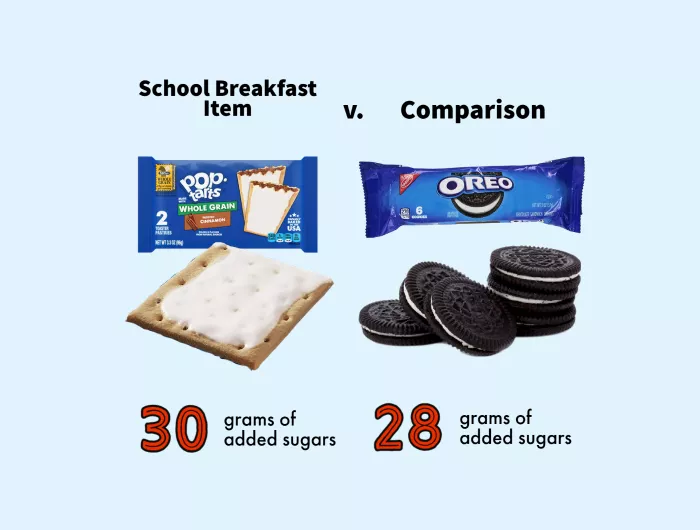Kellogg's urged not to peddle dessert for breakfast to school children

Pop-Tarts sold to school meals program contain about seven teaspoons of added sugars
The Center for Science in the Public Interest says it’s time for Kellogg’s and other food manufacturers to stop serving dessert for breakfast in the school meals program.
The nonprofit nutrition and food safety watchdog group says Kellogg’s is selling school food service providers varieties of Pop-Tarts, such as its twin-pack of Frosted Cinnamon Pop-Tarts Made with Whole Grain, that contain 30 grams of added sugars—about seven teaspoons—in a single package. Excess added sugars in the diet promote type 2 diabetes, weight gain, cardiovascular disease, tooth decay, and other health problems.
Federal law requires that the school lunch and breakfast programs, as well as other foods sold in schools, comport with the Dietary Guidelines for Americans, the once-every-five-years advice published jointly by the U.S. Department of Agriculture and the Department of Health and Human Services. The 2020-2025 edition of the Guidelines recommends Americans limit their added sugars intake to less than 10 percent of calories. For a 2,000 calorie diet, that is equivalent to 50 grams or 12 teaspoons of added sugars.
“Few parents would pack their child a sleeve of six Oreo cookies with the idea that they could be part of a healthy breakfast,” said CSPI senior policy associate Meghan Maroney. “Yet those cookies would have fewer added sugars than some of Kellogg’s Pop-Tarts. It’s time for Kellogg’s to stop pushing dessert for breakfast.”
In November, CSPI examined 2,000 products sold by 28 food companies into the K-12 school market and found that most products met existing guidelines for whole grains and sodium. That School Meals Corporate Report card further found that most companies’ products could meet a new added sugars standard aligned with the 2020-2025 Dietary Guidelines, which would require that meals contain no more than 10% of calories from added sugars.
The Kellogg’s Frosted Cinnamon Pop-Tarts were among some of the most sugary products, and the highest sugar breakfast item, according to CSPI. While the Pop-Tarts sold to schools are marginally healthier than Pop-Tarts found in the grocery store—they include more whole grains—some flavors like Frosted Blueberry still contain the synthetic dyes Red 40, Blue 2, and Blue 1. CSPI says it is inappropriate for synthetic dyes to be used in the school meals program given the dyes may contribute to behavior problems that disrupt learning in some children.
CSPI is urging parents and others via email and social media to ask Kellogg’s to stop selling Pop-Tarts to school meals programs until the company brings down the added sugars to recommended safer levels.
In February, CSPI, the American Heart Association, and the American Public Health Association petitioned the USDA to set a standard for added sugars that is consistent with the Dietary Guidelines for Americans. That would be especially important at breakfast where flavored milks, sugary cereals, syrups, and other foods are widely served. This fall the USDA is expected to begin such a rule-making process.
Besides the Kellogg’s Pop-Tarts, CSPI says there are other products sold to the school meals program that also deliver dessert for breakfast. A two-ounce single-serving container of Post Holdings’ Marshmallow Mateys cereal has 23 grams of added sugars—more than a Butterfinger Bar—and a two-ounce container of General Mills’ Lucky Charms cereal has 19 grams of added sugars—as much as a Hostess Cupcake. Similarly, Rich’s Chocolate Chip and Cinnamon Ultimate Breakfast Rounds (UBR) have 18 grams of added sugars—more than a Nestlé vanilla ice cream sandwich.
“When companies sell dessert for breakfast, they undermine parents’ and schools’ efforts to give kids a healthy start to the day,” said Maroney. “Today, parents are saying enough is enough. Please provide healthier options. ”
Contact Info: Jeff Cronin, jcronin@cspinet.org, or Tia Schwab, tschwab@cspinet.org

